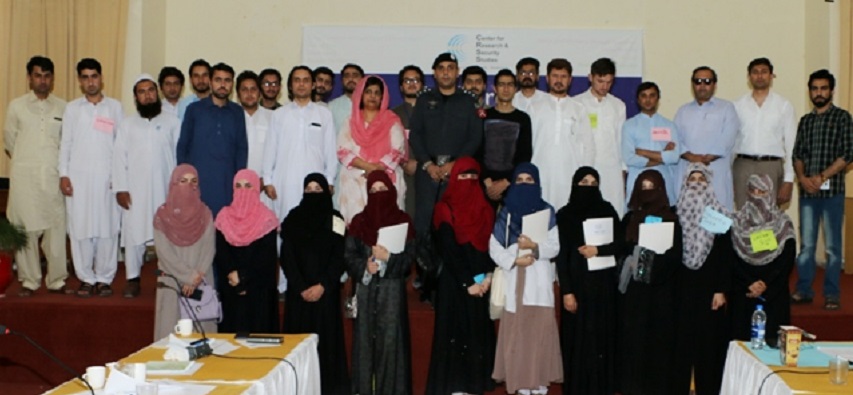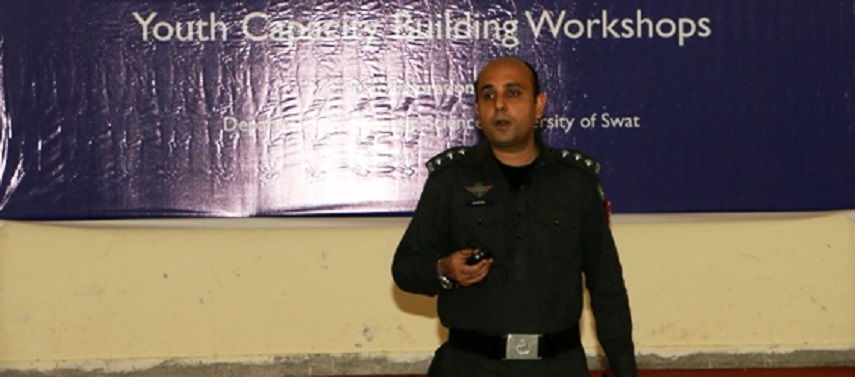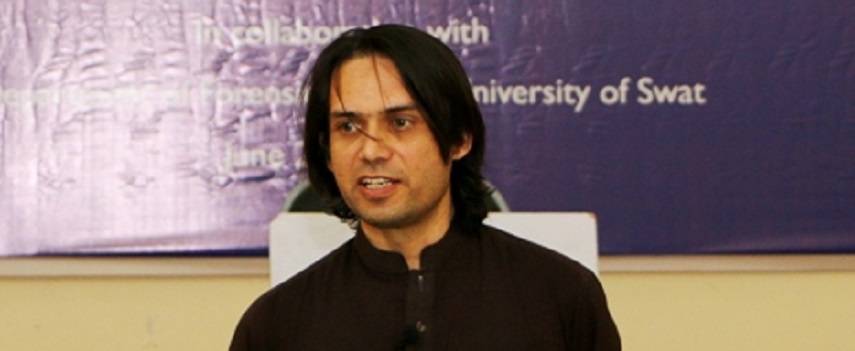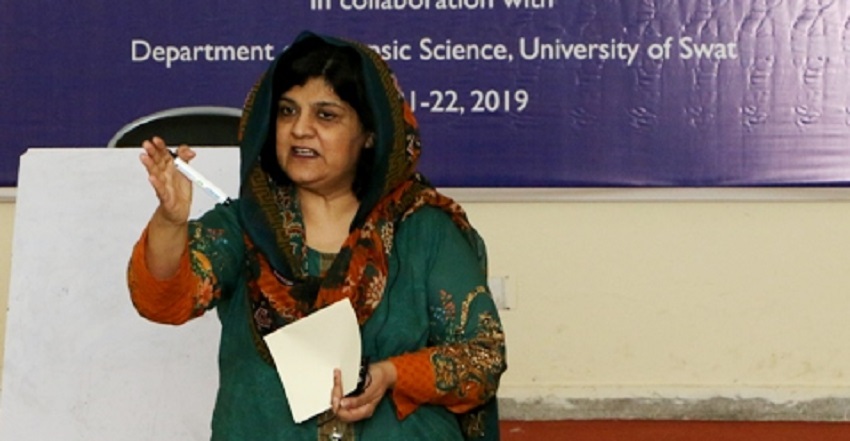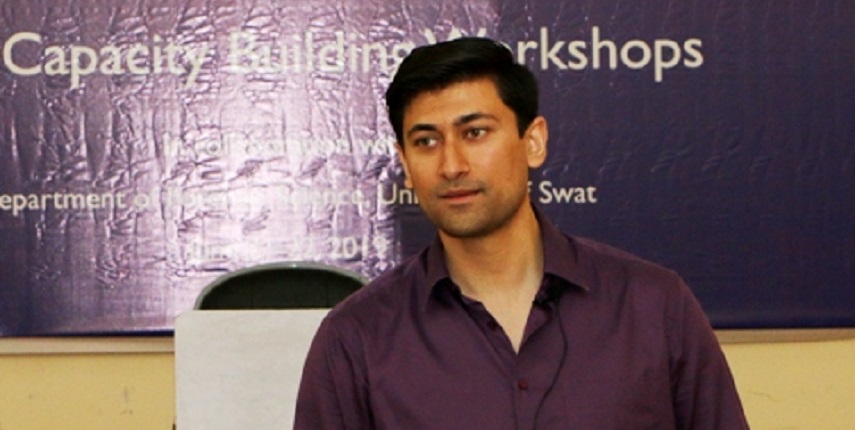Rule of law means that every citizen has certain fundamental rights as well as responsibilities enshrined in the constitution. The youth leaders – regardless of their educational discipline – must study law and constitution as its only by the human rights education, can human rights violation and rule of law be prevented and strengthened respectively. The system of across the board accountability and check and balance – both on the state, government and citizens – is critical to uphold rule of law. The rule of law nourishes in societies which study the law and are aware of their rights and responsibilities available to them in the constitution. Therefore, an essential requirement to become a law abiding citizen and articulate your issues in a dispassionate way, is to study the tenets of rule of law.
These were the notions expressed by Mr. Daniyal Ahmed Javed, a Police Services of Pakistan officer posted in Swat as Assistance District Officer, Frontier Constabulary (PSP, ADOFC Swat), during the twentieth round of Ulasi Taroon, Youth Capacity Building Workshops organized by the Center for Research and Security Studies (CRSS) in collaboration with Department of Forensic Sciences at University of Swat.
Mr. Daniyal Ahmed said that not knowing a law is not an excuse to commit crime and break the law; even misdemeanor. Responsible citizenship demands adherence to rule of law and compliance with the core constitutional values critical to social peace and harmony. A democratic society is characterized by public empowerment through the provision of fundamental human rights equally available to every citizen, including right to fair trail and access to justice. The separation of power among the pillars of the state is critical to uphold rule of law. The state institutions must observe their constitutional limits and executive, legislature and judiciary should only commit to execution, legislation and adjudication respectively.
The future leaders must learn to articulate their concerns through dialogue – in the centrality of discourse embedded in the universally acknowledged democratic values – for the peaceful conflict resolution. Only by adherence to social contract, can societies prosper and the ones devoid of equality and justice cannot survive. Be the change you want to see in the society. You must change yourself if you want to change or address any gaps in the system. The societies don’t experience change overnight; it’s achieved in the long run. Only by adherence to law, can you uphold rule of law.
Law is impartial and binding on every citizen and is equally applicable on everyone regardless on socio-economic or political background. The facilitators of criminals are subject to law as much as the criminals. Harboring, facilitating and protecting the offenders is considered as a felony by law.
Limited resources of police hinder their service delivery capacity. The police in Pakistan need educated foot soldiers. The idea of mob justice is contrary to the fundamental principles of law as law is humane, proportionate, rational and impersonal and it must have a feature of rehabilitation.
There is comprehensive complaint redressal mechanism offered by the police where public also needs to understand the police hierarchy to access the legal services on offer for public facilitation and to ensure accessible justice.
Dr. Israr from University of Swat, said that the core idea of democracy is public empowerment through their participation in the decision making processes, where the public representatives are answerable to the citizens. Democracy may not be perfect but the best available system of governance. Unlike democracy, the public participation in anarchy is extremely limited.
Inclusive democracy, good governance and indiscriminate accountability are the fundamentally essential prerequisites for the socio-political progress and economic development of the country. Only a democratic system of governance can ensure the allocation and distribution of resources on the basis of ideals of equity.
Mrs. Shagufta Khalique, educationist, said that rights and responsibilities are inter-connected. Educating public on the rights and responsibilities anchored in their constitution as well as the international commitments like UDHR is absolutely necessary for social cohesion and peace. The Constitution of Pakistan provides guidelines and basic principles for equal citizenry, however, the role of youth in promoting these ideals of equality and tolerance is direly needed to minimize human rights violations in the society. Respecting and practicing these ideals will result in a fair and transparent society. Once the diversity and differences are accepted in a society, the ultimate result is peace. The first step is to have a holistic and inclusive approach at the individual level and a positive response to the diversity around. She added that at the core of democratic government is accountability. Good governance means across the board the accountability and balance of powers. Democracy is also an attitude that needs to be inculcated among youth with practical examples.
“Conflicts do exist and are permanent; however the negative impacts can be reduced by using different conflict resolution techniques. We must understand that dialogue is the key to resolve the disputes and differences rather than force or coercive means”, Shagufta concluded.
Mr. Shams Momand, Project Manager, CRSS spoke about the role of media including broadcast, print and social media to counter radicalization and disseminate the positive messages and tolerance perspectives. It has tremendous outreach; key to cultivate the public in the cohesive values. The youth should positively use this platform to spread the messages of peace and harmony.
Mr. Malik Mustafa, Manager Programs, CRSS underscored that the key to social cohesion lies in abiding by the core constitutional values of peace, respect and coexistence enshrined in the constitution. The gratitude, optimism and patience are the virtues that can not only nurture happiness but can also change the way the youth can pursue their visions and achieve success as motivated individuals.
The youth – as future leaders – should realize the importance and message multiplication and dissemination and thus – must endeavor to educate the other members of society within their academic, social and professional spheres in the core constitutional values critical to social cohesion and harmony.
Ulasi Taroon is a counter radicalization initiative of CRSS that aims to address the radicalization challenges, extremist ideologies and foster social cohesion through a discourse anchored in the core constitutional values which are fundamentally essential prerequisites for social peace and harmony. The endeavor aims to cultivate and sensitize the youth – in the universities across KP – in the core values in the Pakistani constitution and our social contract. It’s an attempt to highlight the criticality of abiding by these ideals – such as adherence to rule of law, primacy and sanctity of constitution, equal citizenry, responsible citizenship, respect for fundamental human rights, tolerance for diversity and different opinions, inclusive democracy and good governance – as a measure of fostering social cohesion and peaceful co-existence.

